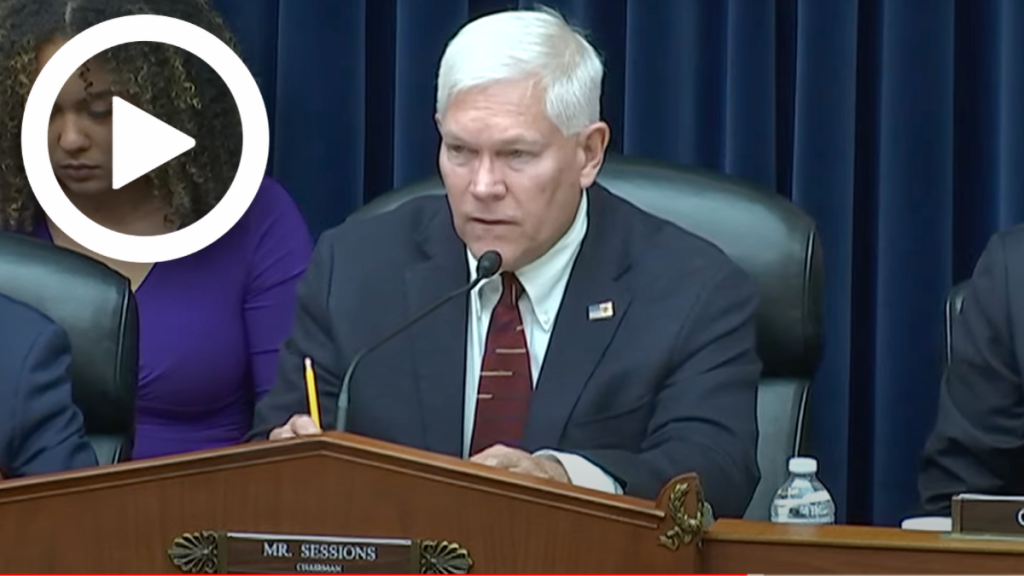Sessions: We Need Measurements to Ensure Government Agencies Using Telework Are Carrying Out their Missions
WASHINGTON—Subcommittee on Government Operations and the Federal Workforce Chairman Pete Sessions (R-Texas) delivered opening remarks at a hearing titled “Oversight of Federal Agencies’ Post-Pandemic Telework Policies.” While the Biden Administration has maintained pandemic-era telework levels for federal agencies, Chairman Sessions emphasized the lack of – and need for – proper reviews and measurements to ensure agencies are still carrying out their missions while implementing telework. Government agencies must put the needs of the American people first and foremost.
Below are Subcommittee Chairman Session’s remarks as prepared for delivery.
Welcome, everyone, to today’s hearing of the House Oversight and Accountability Subcommittee on Government Operations and the Federal Workforce.
Today we are reviewing telework policies at select federal agencies. In May, the Committee sent letters to 25 agencies asking for information around their telework policies.
It took a while, but we ultimately received at least some response from all but three.
The witnesses here today were invited because their responses reflected a good faith effort to answer our questions.
It does not mean there were no gaps in their response, nor does it mean there are no questions regarding their telework plans.
But I do appreciate their responses and believe they will allow us to have a productive conversation.
The north star for any policy impacting federal agencies should put the needs of the American people first.
When federal agencies pivoted to maximum telework at the onset of the COVID pandemic, it was a matter of necessity.
And telework did, and can, play a vital role in continuity of operations. In this Subcommittee’s June hearing, we heard of the problems experienced by those agencies ill-prepared for the shutdown of federal offices.
But what we are talking about today is a matter of day-to-day operations in federal agencies – not an emergency situation.
And as this nation emerged from COVID, it appeared to me – and to my Republican colleagues, that the Biden Administration was attempting to portray the experience during COVID as proof-positive that telework was an unmitigated success.
But there was never any evidence – other than references to a survey of federal employees – what the impact of telework on agency missions was.
I believe federal agencies and private industry alike learned a lot about telework during the COVID years, to include how to improve performance while working away from the office.
And I believe telework can be helpful to agencies as they carry out their missions.
But we are seeing private industry require its employees work in-person more, because they see the value in face-to-face collaboration. And they voice concerns about the impacts of telework, especially on new-hires and younger workers.
And it’s not just private industry – the White House chief of staff sent an Email expressing the same points.
Good oversight – and proper management – require a thorough review before long-term policy decisions are made.
And to the maximum extent possible, they use reliable, objective data wherever possible, and to consider the potential negative impacts as well as the positive.
In the absence of that, me and my Republican colleagues were left to assume this Administration was trying to manage by telling people – in this case, federal workers – what they wanted to hear.
When the House passed the SHOW Up Act in January, this was portrayed as an effort to end all telework.
That is not what the SHOW UP Act did.
It said agencies had to return to pre-pandemic levels of telework until and unless they could certify broader telework policies would have a positive effect on agency missions.
As a result of this Committee’s continued spotlight on the lack of – and need for – proper reviews, OMB issued guidance in April of this year requiring agencies to develop plans.
Plans which include more robust assessments of productivity and customer service – including the effects of telework.
After more than two years, it was about time.
I look forward to reviewing those plans and learning how agencies – and this administration – intend to put agency performance…and the needs of the American people…first and foremost.
Again, I would like to thank today’s witnesses. I look forward to this discussion.
And I now yield to the distinguished ranking member, Mr. Mfume.
